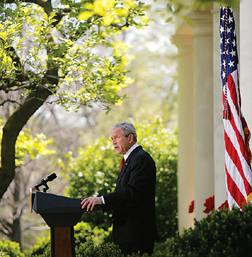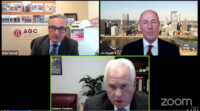 Whitehouse Bush wants new power technology.
|
“I think it was a good signal from the White House that they are ready to engage in discussions,” says Andy Byers, associate vice president of the energy division at Overland Park, Kan.-based Black & Veatch.
Bush made the announcement on the eve of a meeting of global leaders in Paris to discuss climate change. Global warming is also expected to be a major focus of the G8 Summit in Japan this summer.
The plan is short on specifics but sets a new national goal to stop the growth of greenhouse-gas emissions by 2025. President Bush called for more investment in nuclear and clean-coal technologies, as well as technologies to reduce greenhouse-gas emissions from powerplants. He also called for powerplant emissions to decline within 10 to 15 years.
Many Democrats and environmental groups say the plan falls woefully short of what is needed. Eileen Claussen, president of the Pew Center on Global Climate Change, calls the proposal a “step backward” and adds, “This proposal is a non-starter both domestically and internationally.”
Some environmental groups have embraced the much more aggressive goals outlined by various global-warming proposals currently being discussed in Congress, including a cap-and-trade bill introduced by senators Joe Lieberman (I-Conn.) and John Warner (R-Va.), which calls for a 70% emissions reduction from 2005 levels by 2050.
But Sen. James Inhofe (R-Okla.), a vocal foe of global-warming legislation in Congress, praised Bush for taking a more modest approach. “I applaud the President for outlining a bold alternative climate initiative that rejects the concept that the U.S. must adopt economically ruinous cap-and-trade legislation such as the Lieberman-Warner bill,” he said.
resident Bush’s announcement on April 16 of the administration’s new goal for a curb in the growth of greenhouse gasses by 2025 was derided by Democrats and environmental groups, but some industry sources say his announcement is a signal the White House wants a seat at the table in the global debate over climate change. Black & Veatch’s Byers says he likes that President Bush noted the current regulatory framework in the U.S. can make it difficult for new powerplants to be built. Some of the incentives in many state laws are written in such a way that power projects can have a hard time attracting financing, he says. Also, regulators have not worked out who should be liable for the long-term underground storage of CO2. “These are some of the key things right now that...if we don’t address them sooner rather than later, we'll never be able to catch up in time to meet even [the President’s] goals.”



Post a comment to this article
Report Abusive Comment